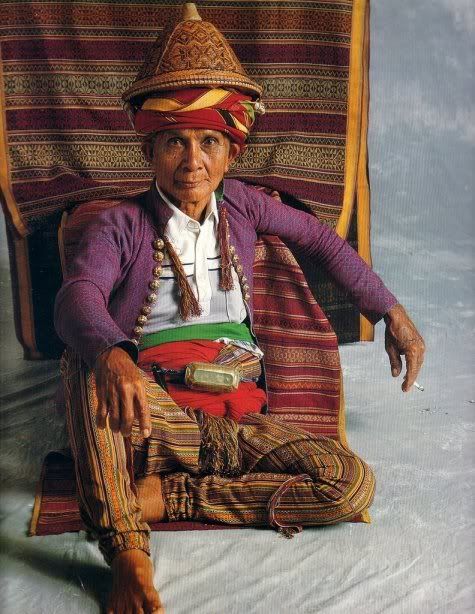He argued that the Badjao, the Sama, and the Luwa’an call the Tausug, of all name --- “A’as Suq”. The Chinese in Sulu on the other hand, called the Tausug as “Taus Suq”, which indicate market scenarios. Suwq or Suuq is Arabic for Market. Because not all people pronounce the same word exactly as it should be pronounce, the original “Suuq” eventually became Sug, and hence, the Tausug means “People of the Market” (Arsad, 2003:9-11)
While many other people did not identify "Bangingi" as among the original 13 Islamized group, it is my conviction as reader of tausug history that the "Bangingi" had been Islamized hand-in-hand with the Tausug and the Sama. In fact, Bangingi played a pivotal role in the struggle against foreign dominions, notably the Spaniards.
The tradition (salsila) of the Sama is spoken daily on “Haw hawo” meaning “very far and fading out” (haw-haw in Tausug). This term by sound shift must have come from the Indonesian or Malaysian word “Jau” which means far away.
The Sama people were the youngest Malaysian migrants to the island. The Sama came many years before 1200A.D. but the greatest number who made settlement were between 1200 A.D. and 1300 A.D.
The Badjao on the other hand are the "danakans (brothers) of the Sama. They are called Badjaw, by the Malay, "Pala-o by the Sama and Luwa'an by the Tausugs. (Kurais 11, 1979-7-16)
"One Muhammedan must be especially mentioned, the Samals, often known as the "sea gypsies" from their wandering maritime habits. They live either on the immediate shore or outright on the boats, and do not practice agriculture and derived their living from fishing, trade, or piracy. Both groups Badjao or "Samal Laut", the sea people. Both groups generally acknowledged the suzerainty of the Sultan of Sulu and furnished and mainstay of the crews on his expeditions. They are extremely interesting people of a house inner made of live very little in known.
Yakan - they are native of Basilan, and mostly found in the interior of the Province. On closer examination, the Yakan may not be a truly distinct ethnic group but rather a subgroup of the Sama, a larger ethno linguistic group of Bangsamoro (Abbahil 1984:208). They speak a dialect of Sama language (Sinama or Siama), and to a lesser extend Tausug language and are culturally influences in some respect by the Tausug.
This is not surprising, since etymological development occurs simultaneously with the contact with other people. The tausug, Sama, Bangingi and Yakans had been in close contact with each other since the age of the Sultanate.
Traditionally, the Yakan, formed part of the Sulu Sultanate and the Sulu Cultural World. They are land bound agriculturist cultivating upland rice, corn and other crops. They do not normally live in compact villages but build their houses just out of sight of each other scattered among their plots of farmlands.
According to Dean Calbi A. Asain, the word “Basilan” comes from “Basi” meaning “iron” and “Lan” meaning “way or road” which is done to the Tausug.
The prominent person in each community of Yakan is the Imam who combines both religious and socio-political leadership. This makes the Yakan community distinct from Maguindanaon, Maranao, and Tausug communities where the Datu is the socio-politico leader.
In the early days of the Sultanate, particularly in the reign of Sultan Harun Al-Rashid had established his court in Palawan, then transferred to Dungun in Tawi-tawi, where he, according to tradition breath his last.
The states of Palawan, according to Sultanate system of arrangement, stands to overseer the Visayas and Luzon and take orders directly to the Sultan of Sulu. Thus, may be the heavy influence of the Tausug of their culture.
In recent political history of the Muslims in Palawan, two of the elective mayors of Batarasa were Tausugs.
As a result, of the close contact of the Tausug the Islamization of these tribes could have came from Tausug missionaries, reinforce of course by missionary activities from Borneo.
Dayang Naifah



0 comments: